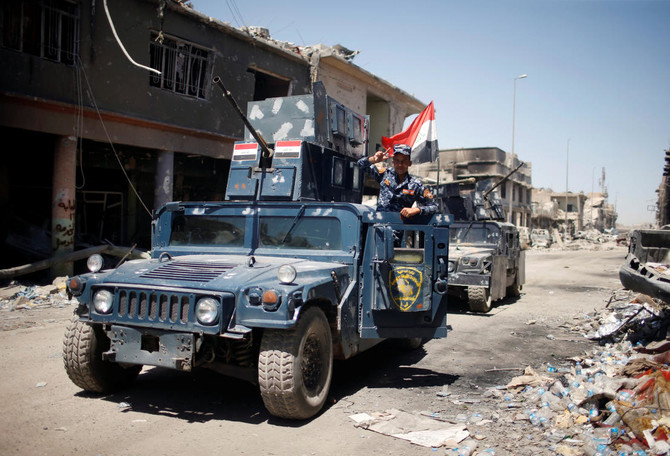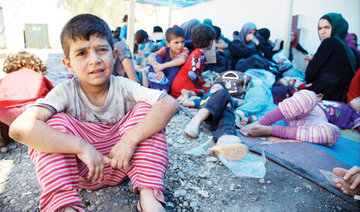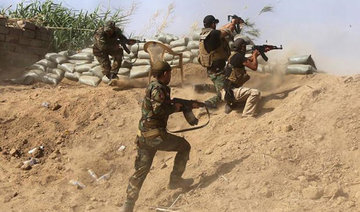BAGHDAD: The wires protruding from the small, misshapen stuffed animal revealed the deadly booby-trap tucked inside.
For the people of Mosul, the sophisticated bomb was a reminder of how difficult it will be to return to homes littered with hidden explosives by Daesh militants and dotted with the remnants of undetonated bombs dropped by the US-led coalition that still could blow up.
Washington at least is trying to ease a bit of the massive clean-up burden.
On Thursday, the top US commander in Iraq said for the first time that the American military will help contractors and other officials locate unexploded bombs dropped by the coalition. US Embassy officials have asked the coalition to declassify grid coordinates for bombs dropped in Iraq to help clear the explosives.
It may not be that simple, Gen. Stephen Townsend told a small group of reporters, “but we’ll find a way through that.”
“We’ll find a way to help them,” he said.
The coalition’s unexploded bombs are only a small part of Mosul’s problems. The bulk of the explosives have been hidden by Daesh fighters to be triggered by the slightest movement, even picking up a seemingly innocent child’s toy, lifting a vacuum cleaner, or opening an oven door. The effort could continue wreaking destruction on Iraq’s second largest city even as Daesh was defeated after a nine-month battle.
US Embassy officials and contractors hired to root out the hidden explosives use the same words to describe the devastation in western Mosul: Historic. Unprecedented. Exponentially worse than any other place.
“We use broad terms like historic because when you enter a dwelling, everything is suspect,” said the team leader in northern Iraq for Janus Global Operations, a contracting company hired to find and remove hidden explosive devices and unexploded bombs from Iraqi cities recaptured from the Daesh group. “You can’t take anything at face value.”
The team leader asked that he not be identified by name because he and his teams continue working in Mosul and the company fears for their safety.
Some estimates suggest it may take 25 years to clear West Mosul of explosives. The bomb-removing team leader said those understate what is sure to be a long, enduring problem.
Normalcy may return to parts of west Mosul in a year, and perhaps after a decade many of the obvious explosives will be found. But other unexploded bombs and hidden devices will surface at construction sites and other locations for years and likely decades to come, he said.
As much as 90 percent of west Mosul’s old city has been reduced to ruins, destroyed by the Daesh militants who occupied it for nearly three years and by the campaign of airstrikes and ground combat needed to retake the city.
For Muhammed Mustafa, a restaurant owner from west Mosul, the disaster is very personal.
“In the beginning we thanked God we had been liberated from our oppressor,” said Mustafa, 54, who had lived in Mosul’s old city.
Mustafa escaped Daesh territory as Iraqi forces pushed through western Mosul earlier this year and is now living with extended family in the city’s east.
“When my neighborhood was liberated, I wanted to return and gather some belongings. On my street all I saw was destruction, except my home, thank God, but I found a written statement on the wall warning it was bobby-trapped,” he told The Associated Press in a phone interview. “When I saw it, I couldn’t stand. I fell to the ground.”
Security forces in the area barred him from entering due to the risk.
“They said there were many houses like it and many people had already died trying to inspect their homes when a bomb inside exploded,” he said. “Can you imagine, the house I grew up in, now I can no longer enter?“
David Johnson, vice president for the Washington office of Janus Global Operations, said his workers are finding explosives where local residents would be most likely to trigger them, and are “seeing a level of sophistication and a number of improvised explosive devices that is literally without parallel.”
Over time, the officials said, the improvised explosive devices — or IEDs — have become far more innovative and sophisticated. They range from basic pressure plates in the roads or doorways to small devices, similar to ones that turn on a refrigerator light when the door is opened. They’re tucked into dresser drawers or smoke detectors, or buried under large piles of rubble that were pushed aside as Iraqi forces cleared roads to move through the city.
The devastation is so extensive and the danger so high that government and humanitarian agencies have been unable to get a full assessment of the explosives threat or a solid estimate of how much money and effort is needed to make the city safe and livable again.
The team leader painted a grim picture of the city where his workers have spent the last two weeks trying to clear explosives from critical infrastructure, including the electric grid.
A retired Navy explosives specialist who served multiple tours in Iraq and Syria, he said his team is “facing something we’ve never seen before.”
In the Navy, he said, his worst day involved finding 18 explosive devices. On Wednesday, on the outskirts of Mosul, his team cleared 50 explosive devices out of a pipeline. He estimated as many as 300 in that one area alone.
There are five such teams, totaling 130 people, working in Mosul. So far, no one has been injured. In Ramadi, however, company workers were killed and injured as they tried to eliminate explosives. Janus wouldn’t provide details.
Clearing Iraqi cities of explosives may take decades
Clearing Iraqi cities of explosives may take decades

US says supports gas deals with Kurdistan region after Iraq lawsuit

- “We encourage Baghdad and Irbil to work together to expand domestic gas production as soon as possible
WASHINGTON: The United States said Tuesday it supported American energy companies’ contracts with Iraq’s autonomous Kurdish region after the Iraqi government filed a lawsuit against them.
Regional prime minister Masrour Barzani announced the signing of the two deals valued at tens of billions of dollars during a visit to Washington, in which he met Friday with Secretary of State Marco Rubio.
Rubio in his meeting “commended” the deals with US companies, State Department spokeswoman Tammy Bruce told reporters.
“We encourage Baghdad and Irbil to work together to expand domestic gas production as soon as possible. These types of economic partnerships will benefit both the American and Iraqi peoples and help Iraq move toward energy independence,” she said.
“We also believe that US and Iraqi interests are best served by having a strong, resilient Iraqi Kurdistan region within a sovereign and prosperous federal Iraq
“As far as the nature of the lawsuits, obviously we are looking forward to continuing these kinds of deals. We expect these kinds of deals to flourish, and expect and would hope that they would be facilitated,” she said.
Israeli troops fire warning shots as Palestinians overwhelm new Gaza food center

- The UN and other humanitarian organizations have rejected the new system, saying it won’t be able to meet the needs of Gaza’s 2.3 million people
MUWASI, Gaza Strip: Chaos erupted on the second day of aid operations by a new US-backed group in Gaza as desperate Palestinians overwhelmed a center distributing food on Tuesday, breaking through fences. Nearby Israeli troops fired warning shots, sending people fleeing in panic.
An AP journalist heard Israeli tank and gunfire and saw a military helicopter firing flares. The Israeli military said its troops fired the warning shots in the area outside the center and that “control over the situation was established.”
At least three injured Palestinians were seen by The Associated Press being brought from the scene, one of them bleeding from his leg.
The distribution hub outside Gaza’s southernmost city of Rafah had been opened the day before by the Gaza Humanitarian Foundation, which has been slated by Israel to take over aid operations. The UN and other humanitarian organizations have rejected the new system, saying it won’t be able to meet the needs of Gaza’s 2.3 million people and allows Israel to use food as a weapon to control the population. They have also warned of the risk of friction between Israeli troops and people seeking supplies.
Palestinians have become desperate for food after nearly three months of Israeli blockade pushed Gaza to the brink of famine.
Palestinians walk miles for food, finding chaos
Palestinians at the scene told AP that small numbers of people made their way to the GHF center Tuesday morning and received food boxes. As word spread, large numbers of men, women and children walked for several miles from the sprawling tent camps along Gaza’s Mediterranean coast. To reach the hub, they had to pass through nearby Israeli military positions.
By the afternoon, hundreds of thousands were massed at the hub. Videos show the crowds funneled in long lines through chain-link fence passages. Two people said each person was searched and had their faces scanned for identification before being allowed to receive the boxes. Crowds swelled and turmoil erupted, with people tearing down fences and grabbing boxes. The staff at the site were forced to flee, they said.
The AP journalist positioned some distance away heard gunfire and rounds of tank fire. Smoke could be seen rising from where one round impacted. He saw a military helicopter overhead firing flares.
“There was no order, the people rushed to take, there was shooting, and we fled,” said Hosni Abu Amra, who had been waiting to receive aid. “We fled without taking anything that would help us get through this hunger.”
“It was chaos,” said Ahmed Abu Taha, who said he heard gunfire and saw Israeli military aircraft overhead. “People were panicked.”
Crowds were seen running from the site. A few managed to secure aid boxes — containing basic items like sugar, flour, pasta and tahini — but the vast majority left empty-handed.
US-backed group says they ‘fell back’ to ensure safety
In a statement, GHF said that because of the large number of Palestinians seeking aid, staff at the hub followed the group’s safety protocols and “fell back” to allow them to dissipate, then later resumed operations.
A spokesperson for the group told the AP that no shots were fired from GHF. Speaking on condition of anonymity in line with the group’s rules, the spokesperson said the protocols aim at “avoiding loss of life, which is exactly what happened.”
GHF uses armed private contractors to guard the hubs and the transportation of supplies. The hub is also close to Israeli military positions in the Morag Corridor, a band of territory across the breadth of Gaza that divides Rafah from the rest of the territory.
GHF has set up four hubs around Gaza to distribute food, two of which began operating on Monday — both of them in the Rafah area.
The UN and other humanitarian groups have refused to participate in GHF’s system, saying it violates humanitarian principles. They say it can be used by Israel to forcibly displace the population by requiring them to move near the few distribution hubs or else face starvation – a violation of international law. They have also opposed the use of facial recognition to vet recipients.
Israeli Prime Minister Benjamin Netanyahu on Tuesday commented on the turmoil at the Rafah center, saying, “There was some loss of control momentarily … happily we brought it under control.”
He repeated that Israel plans to move Gaza’s entire population to a “sterile zone” at the southern end of the territory while troops fight Hamas elsewhere.
UN says it has been struggling to transport aid
Israel has said the new system is necessary because it claims Hamas has been siphoning off supplies that reach Gaza. The UN has denied that any significant diversion takes place.
Throughout the war, the UN and other aid groups have conducted a massive operation distributing food, medicine and other supplies to wherever Palestinians are located. Israel says GHF will replace that network, but the past week has allowed a trickle of aid to enter Gaza for the UN to distribute.
COGAT, the Israeli military agency in charge of coordinating aid, said on Tuesday that 400 trucks of supplies, mainly food, was waiting on the Gaza side of the main crossing from Israel, but that the UN had not collected them. It said Israel has extended the times for collection and expanded the routes that the UN can use inside Gaza.
Jens Laerke, spokesperson for the UN humanitarian office OCHA, told reporters in Geneva that agencies have struggled to pick up the supplies “because of the insecure routes that are being assigned to us by the Israeli authorities to use.” He said the amount of aid allowed the past week was “vastly insufficient.”
Israeli strike on south Lebanon kills one: ministry

- The ministry said an “Israeli enemy strike” on a motorcycle killed one man in Yater
- The Israeli military did not immediately comment on the attack
BEIRUT: Lebanon’s health ministry said an Israeli strike on south Lebanon killed one man on Tuesday, the latest attack despite a ceasefire between Israel and Iran-backed Hezbollah.
In a statement, the ministry said an “Israeli enemy strike” on a motorcycle killed one man in Yater, in south Lebanon’s Bint Jbeil district.
The Israeli military did not immediately comment on the attack, which came after it said it killed a Hezbollah member in south Lebanon’s Majdal Zoun on Monday.
Israel has continued to launch strikes on its northern neighbor despite the November truce that sought to halt more than a year of hostilities with Hezbollah, including two months of full-blown war.
Under the terms of the ceasefire deal, only UN peacekeepers and the Lebanese army should be deployed in southern Lebanon, though Israel has kept its forces in five areas it has declared strategic.
Lebanon has called on the international community to pressure Israel to end its attacks and withdraw all its troops.
UN says it has no information over Gaza aid group deliveries

GENEVA: The United Nations said on Tuesday it had no information on whether the Gaza Humanitarian Foundation, a US-backed aid group, had actually delivered any supplies inside the war-ravaged Palestinian territory.
The little-known group, which has stirred controversy since surfacing in early May, announced on Monday it had begun distributing truckloads of food in the Gaza Strip.
But officials from the UN humanitarian agency OCHA, and UNRWA, the UN agency for Palestinian refugees, said they were unaware whether any aid had actually been distributed.
The UN and international aid agencies have said they will not cooperate with the GHF, amid accusations it is working with Israel without any Palestinian involvement.
“It is a distraction from what is actually needed, which is a reopening of all the crossings in to Gaza; a secure environment within Gaza; and faster facilitation of permissions and final approvals of all the emergency supplies that we have just outside the border that need to get in,” OCHA spokesman Jens Laerke told a press briefing in Geneva.
UNRWA spokeswoman Juliette Touma told journalists aid to Gaza was still “very, very far” from what was needed: a minimum of 500 to 600 trucks per day loaded with food, medical aid, fuel, water and other basic supplies, she said, speaking via video-link from Amman.
Israel, which recently stepped up its offensive against militant group Hamas, drew international condemnation after implementing a blockade on March 2 that has sparked severe food and medical shortages.
Humanitarian aid has begun trickling back into Gaza in recent days after Israel lifted the 11-week blockade.
Touma said no UNRWA supplies had gone in since March 2, while Laerke said he had no information on how many UN trucks had passed through the Kerem Shalom crossing in the last 24 hours, partly because Israel does not allow them to have a fixed presence there.
Israeli forces raid foreign exchange stores across West Bank

- One killed, eight other people were injured by Israeli forces during a raid in Nablus
RAMALLAH: Israeli forces raided foreign exchange stores in several West Bank cities including Ramallah and Nablus on Tuesday, accusing their parent company of “connections with terrorist organizations,” according to an army closure notice.
“Israeli forces are taking action against Al-Khaleej Exchange Company due to its connections with terrorist organizations,” a leaflet left at the company’s Ramallah location read.
An AFP journalist present at the scene reported several army vehicles at the store’s entrance while soldiers came out carrying items covered by a cloth.
Two army vehicles escorted one of the store’s employees away from the premises.
In the northern West Bank city of Nablus, Israeli forces raided a second foreign exchange store belonging to the Al-Khaleej company, as well as a gold store, according to another AFP journalist.
Some Palestinian residents of Nablus were seen clashing with the army during the raid, throwing objects at troops.
The Ramallah-based Ministry of Health said one man was killed and eight other people were injured by Israeli forces’ live ammunition during a raid in Nablus on Tuesday.
The Palestinian Red Crescent said it treated 20 people for tear gas inhalation and three others who were injured by rubber bullets.
The Palestinian movement Hamas condemned the raids on foreign exchange shops.
“These assaults on economic institutions, accompanied by the looting of large sums of money and the confiscation of property, are an extension of the piracy policies adopted by the (Israeli) government,” the group said in a statement, adding that the targeted companies were “operating within the law.”






















